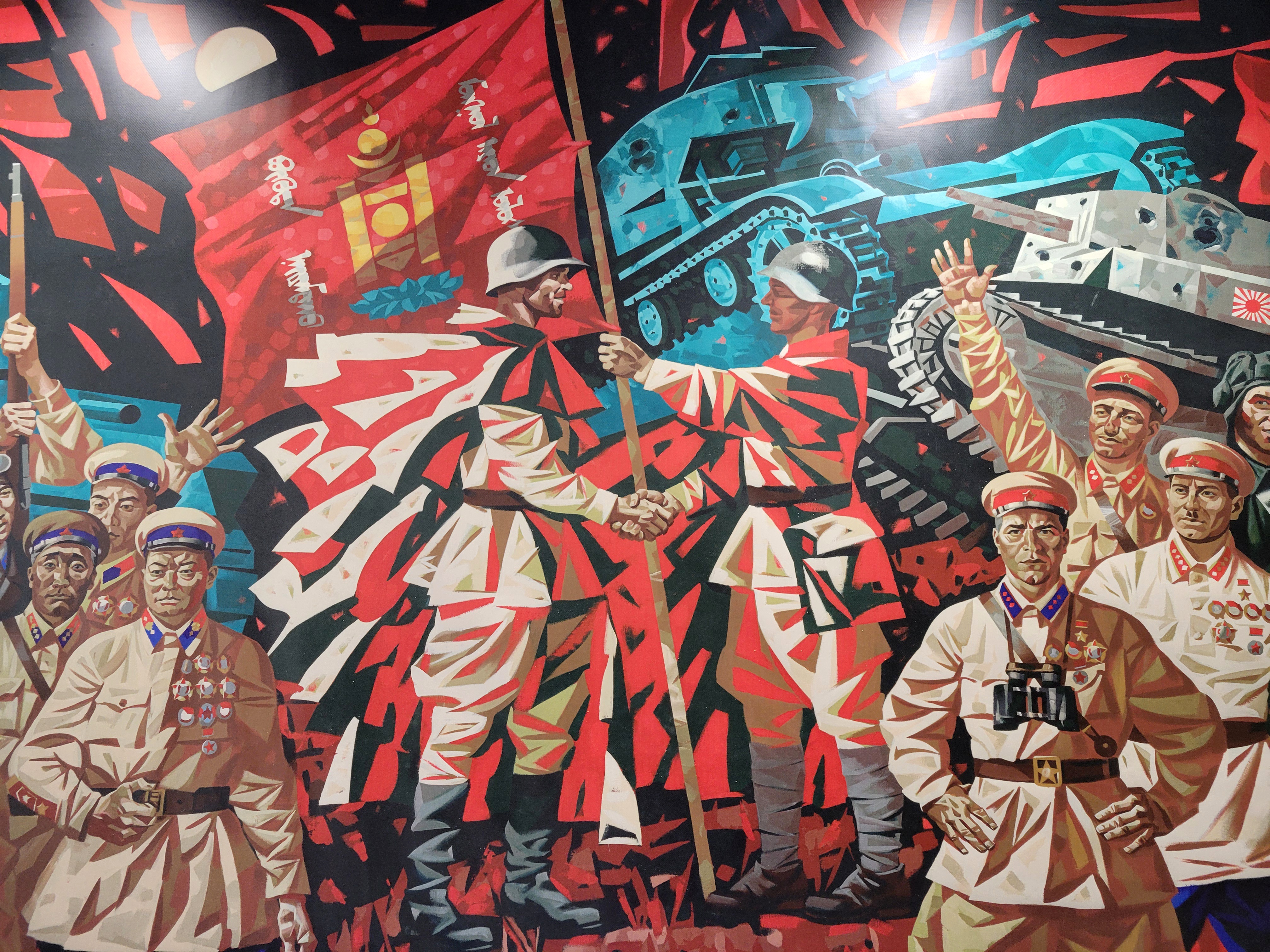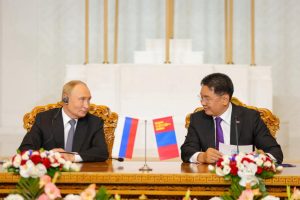This year marks the 85th anniversary of the Battle of Khalkhin Gol, which has become a touchstone of Mongolia-Russia relations. In a series of battles in 1939, Soviet and Mongolian forces worked together to drive off Japanese advances.
In recognition of the anniversary’s historical and diplomatic significance, Russian President Vladimir Putin made an official visit to Mongolia on September 3. Much was made of the visit, as the International Criminal Court issued an arrest warrant for Putin in March 2023, and Mongolia was the first ICC member country to host the Russian leader since.
As expected, Ulaanbaatar prioritizes national interest over taking a side in Russia’s foreign war with Ukraine.
On September 3, Putin arrived in Ulaanbaatar at the invitation of Mongolian President Khurelsukh Ukhnaa to commemorate the 85th anniversary of the Battle of Khalkhin Gol, also known as the Battle of Khalkh River. The battle was an armed encounter with the Imperial Japan’s Kwangtung Army in 1939, just a couple months before Europe erupted into war with Nazi Germany.
But by 1939, Mongolia’s neighbor, China, had already been at war with Imperial Japan for two years, occupying territories through a puppet kingdom set up in northeastern China, then known as Manchuria. Japan’s moves further threatened Mongolia’s sovereignty. Sandwiched between Russia and China, Mongolia had to act, and it did so by establishing joint armed forces with Russia to thwart Imperial Japan’s expansion to Mongolia’s very northeastern tip, Khalkhin Gol. To Mongolia, the conflict was a defining battle to secure its border from foreign invasion.
In military history, even the smallest battles can play an important role in forming the foundation for partnerships and alliances. Although it’s little known overseas, to Mongolia and Russia, the Battle of Khalkhin Gol was and still is an important element of their partnership.

Artwork depicting Mongolian-Soviet cooperation during the Battle of Khalkhin Gol. Artwork from the Chinggis Khaan Museum’s Khalkhin Gol Battle Gallery.
However, Putin’s visit to Mongolia has been highly criticized by several countries and international organizations. Ukrainian lawmakers, the European Union, the U.S. State Department, and others have highlighted Mongolia’s obligation to the Rome Statue, which calls on member states to comply with ICC arrest warrants
U.S. State Department spokesperson Matt Miller told journalists in a September 3 press briefing: “We do very much understand the difficult position that Mongolia is in. It’s a much smaller country between two neighbors. We look to continue to support Mongolia, but we do think it’s important that they uphold their international obligations.”
Miller also highlighted that “it’s important that if they do communicate with Russia that they make clear that they support Ukraine’s territorial integrity and sovereignty.”
The United States (along with China and Russia) is not a signatory to the ICC.
To Ulaanbaatar, however, the Battle of Khalkhin Gol commemoration has long been part of the traditional partner diplomacy that Mongolia upholds with its two neighbors, Russia and China. Despite changes in administrations and leadership, the Battle of Khalkhin Gol is part of Mongolia’s history and even more significant for Mongolia-Russia ties. Such anniversaries, while celebrated consistently, are also a time for Ulaanbaatar and Moscow to assess their bilateral ties.
The last time Putin visited Mongolia was in 2019, to commemorate the 80th anniversary of the Battle of Khalkhin Gol. During his visit, then-President of Mongolia Battulga Khaltmaa and Putin upgraded the 2005 bilateral strategic partnership to a comprehensive strategic partnership. Two years later, in 2021, Mongolia and Russia celebrated the 100th anniversary of diplomatic relations.
However, since establishing the comprehensive strategic partnership in 2019, Moscow’s focus has shifted toward its war with Ukraine. Thus the Mongolia-Russia relationship has lagged, although there has been progress on Mongolia-Russia energy deals as well as trilateral opportunities with Beijing. Hence, Putin’s recent visit also demonstrates an assessment of the Ulaanbaatar-Moscow partnership in real economic and development terms.
In keeping with Ulaanbaatar’s multi-pillared foreign policy, Mongolia opts out of superpower competition and hard power approaches. Mongolia will always prioritize its national interests over being a pawn in a much larger conflict that Ulaanbaatar cannot provide a solution to. Therefore, despite the ICC arrest warrant and Western criticism of Putin’s visit, Mongolia believed that hosting the Russian leader was more in line with its national interests – including the need to address Mongolia’s growing demand for energy.
Mongolia imports all of its oil, and 95 percent of that comes from Russia.
During Putin’s visit to Mongolia, the two sides signed five bilateral cooperation agreements on mining, an oil refinery, energy, education, and health.
According to the Foreign Ministry of Mongolia’s press release, Minister of Energy Choijilsuren Battogtokh and Russian Minister of Energy Sergei Tsivilev signed an agreement on the “extension and renovation project of the third power station of Ulaanbaatar in Mongolia.” In practice, the renovation ought to ensure Ulaanbaatar’s increasing energy consumption. The power station provides nearly one-third of the heat supply to Mongolia’s capital; the cooperation agreement will see the plant expanded with a new 50MW block, while undertaking studies for building a new 250 MW block. Total costs and timelines are still undetermined.
The two sides also signed an agreement to expand the supply of petroleum products to Mongolia. The agreement to continue “smooth and stable supply of oil products” from Russia to Mongolia – essentially exempting Mongolia from Moscow’s 2023 restrictions on such exports – was signed by Mongolia’s Minister of Industry and Federal Mineral Resources Tuvan Tsevegdorj and Tsivilev.
Moreover, Mongolia and Russia signed an agreement to supply aircraft fuel to Mongolia’s newly established airport and aircraft industry as Ulaanbaatar aims to boost its tourism-based economy.
Mongolia’s energy security is one of the country’s most pressing issues. While recognizing the need to diversify its energy resources, Ulaanbaatar is looking to build the Eg River hydropower plant in Mongolia’s Selenge river basin. A 2019 study indicated that “[t]he Egiin Gol Hydropower Project (HPP), located on the Eg River, a tributary of the Selenge River, 580 km upstream from Lake Baikal, would respond especially to the peak seasonal demands for electricity in the central part of Mongolia.” However, the project has faced objections from Russia, ostensibly over environmental concerns.
With the Eg hydropower project in mind, Mongolia’s Minister of Environment and Climate Change Odontuya Saldan and Russian Minister of Natural Resources and Ecology signed an agreement on cooperation in protecting the Selenge River basin. According to Mongolia, the agreement is a step toward conducting a joint environmental assessment that will pave the way for the Eg River hydropower plant.
“Realizing that the protection of Lake Baikal and the Selenge River makes an important contribution to the state of the world’s environment, we will intensify the practical implementation of long-term dialogue over the proper use of water resources, regulation of flow, and the creation of renewable energy,” the Foreign Ministry’s summary of the agreement said.
Addressing the Eg River hydropower plant’s environmental and climate issues are crucial as Mongolia aims to be an active participant and supporter of the global fight against climate change. With the recent five agreements with the Russian government, Mongolia hopes to secure its energy needs while living up to international standards on climate issues.
Putin’s visit to Mongolia was criticized by many members of the international community. But in Mongolia’s multi-pillared foreign policy, having strong diplomatic relations with both neighbors is fundamental. This is not something that can be altered due to Russia’s or China’s foreign affairs.
The fact that Mongolia did not arrest Putin is an indication of Ulaanbaatar’s independent foreign policy. Mongolia sees its national interest as lying elsewhere: in securing Mongolia’s energy needs, while developing alternative and green energy with partners around the world.

































